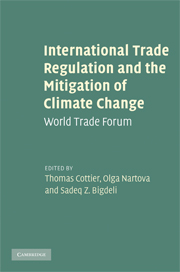Book contents
- Frontmatter
- Contents
- Contributors
- List of figures
- List of tables
- List of abbreviations
- Preface
- PART I Climate change mitigation: scientific, political and international and trade law perspectives
- PART II Climate change mitigation and trade in goods
- PART III Trade in renewable energy sources
- PART IV Climate change mitigation and trade in services
- PART V Climate change and technology transfer, investment and government procurement: legal issues
- PART VI Institutional challenges and the way forward
- 19 Institutional challenges to enhance policy co-ordination — how WTO rules could be utilised to meet climate objectives?
- 20 Environmental goods and services: the Environmental Area Initiative approach and climate change
- Index
- References
20 - Environmental goods and services: the Environmental Area Initiative approach and climate change
from PART VI - Institutional challenges and the way forward
Published online by Cambridge University Press: 04 August 2010
- Frontmatter
- Contents
- Contributors
- List of figures
- List of tables
- List of abbreviations
- Preface
- PART I Climate change mitigation: scientific, political and international and trade law perspectives
- PART II Climate change mitigation and trade in goods
- PART III Trade in renewable energy sources
- PART IV Climate change mitigation and trade in services
- PART V Climate change and technology transfer, investment and government procurement: legal issues
- PART VI Institutional challenges and the way forward
- 19 Institutional challenges to enhance policy co-ordination — how WTO rules could be utilised to meet climate objectives?
- 20 Environmental goods and services: the Environmental Area Initiative approach and climate change
- Index
- References
Summary
Introduction
An inquiry into the potential contribution of international trade regulation and the law of the World Trade Organization (WTO) to climate change mitigation inevitably focuses attention on the basket of negotiations on environmental goods and services (EGS), mandated by paragraph 31(iii) of the Doha Ministerial Declaration (DMD). This effort stems from established insights that trade liberalisation and environmental protection are potential ‘win-win’ constellations. The same philosophy applies to policies which seek to promote investment and trade in technologies for combating emissions of greenhouse gases (GHGs). It equally applies to the promotion of renewable and alternative energy sources. Relevant goods and services may be identified and brought to the negotiating table and could result in appropriate sectoral initiatives with a view to lowering trade barriers in these fields in terms of tariff protection, discrimination in services, technical barriers to trade, intellectual property protection and technology transfer.
The EGS negotiations so far, however, have witnessed major difficulties in bringing about such results. Several reasons lie behind the stalemate in the negotiations up to the close of 2007. The definition of environmental goods and its demarcation from regular non-agricultural market access negotiations (NAMA) pose consensus problems. The proposed listings of potential goods are considered to be too broadly defined and over-inclusive, arguably leading to NAMA negotiations in disguise. Moreover, since most of these goods and advanced technologies are concentrated in developed countries, an appropriate balance of interests is difficult to achieve, even taking into account so called environmentally preferable products (EPPs) from developing countries.
- Type
- Chapter
- Information
- International Trade Regulation and the Mitigation of Climate ChangeWorld Trade Forum, pp. 395 - 419Publisher: Cambridge University PressPrint publication year: 2009



